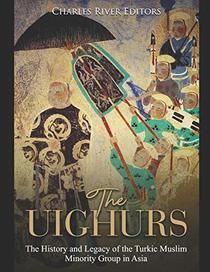Because I've been watching news programs that mention the Uighurs often, I wanted to learn more about this group that is persecuted by the CCP (Chinese Political Party). Most Uighurs live in East Turkestan, more known as the Xinjiang Uighur Autonomous Region of the People's Republic of China. Although the Uighurs are called autonomous, they are not. They are also being forcibly sterilized so they do not have more children.
Uighurs are an ancient race of people with features, unlike the Han Chinese. They often have blue eyes, blond, light brown, and reddish hair. Historians think their culture is about 9000 years old. Most of them are Sunni Muslims. According to the Chinese, the Uighurs moved into their current locale in the 840s CE. The Uighurs consider themselves to be a combination of Caucasian and East Asian descent.
This book outlines the long history the Uighurs have suffered through as minorities denied their rights. Genghis Khan helped the Uighurs because he believed in religious liberty. Genghis took the Uighurs as a vassal state to the Mongols and offered Uighurs as tax collectors and other high-ranking officials. The Uighurs were literate; more so than the Mongols. A Uighur was the physician to the Khan and dictated his dietary choices. Kublai Khan changed the treatment of Uighurs by creating anti-Muslim rules. This caused the wealthier Uighurs to search for greener pastures.
The Chinese government has taken a toll on the Uighurs. In the 1950s, they were 95% of the population in their region; today they are 45%. Many Uighurs have disappeared; others have been moved to re-education camps (really concentration camps) and used for forced labor. Uighur mosques, religious texts, and rituals have been destroyed. Since the beginning of the 2000s, new sanctions have been made against the Uighurs. They are also the butt of fake news in China against their people; in one narrative, the Uighurs have been labeled Al-Qaida. They are forced to give up their traditions and adopt Mandarin; they are also subjected to organ harvesting.
One of the difficulties I experienced was that I listened to this book and did not have the benefit of seeing any photos or drawings about the Uighurs. Because it is not a culture familiar to me, I found that to be a serious disability. I sat at the computer and looked up things mentioned in the text.
Uighurs are an ancient race of people with features, unlike the Han Chinese. They often have blue eyes, blond, light brown, and reddish hair. Historians think their culture is about 9000 years old. Most of them are Sunni Muslims. According to the Chinese, the Uighurs moved into their current locale in the 840s CE. The Uighurs consider themselves to be a combination of Caucasian and East Asian descent.
This book outlines the long history the Uighurs have suffered through as minorities denied their rights. Genghis Khan helped the Uighurs because he believed in religious liberty. Genghis took the Uighurs as a vassal state to the Mongols and offered Uighurs as tax collectors and other high-ranking officials. The Uighurs were literate; more so than the Mongols. A Uighur was the physician to the Khan and dictated his dietary choices. Kublai Khan changed the treatment of Uighurs by creating anti-Muslim rules. This caused the wealthier Uighurs to search for greener pastures.
The Chinese government has taken a toll on the Uighurs. In the 1950s, they were 95% of the population in their region; today they are 45%. Many Uighurs have disappeared; others have been moved to re-education camps (really concentration camps) and used for forced labor. Uighur mosques, religious texts, and rituals have been destroyed. Since the beginning of the 2000s, new sanctions have been made against the Uighurs. They are also the butt of fake news in China against their people; in one narrative, the Uighurs have been labeled Al-Qaida. They are forced to give up their traditions and adopt Mandarin; they are also subjected to organ harvesting.
One of the difficulties I experienced was that I listened to this book and did not have the benefit of seeing any photos or drawings about the Uighurs. Because it is not a culture familiar to me, I found that to be a serious disability. I sat at the computer and looked up things mentioned in the text.




